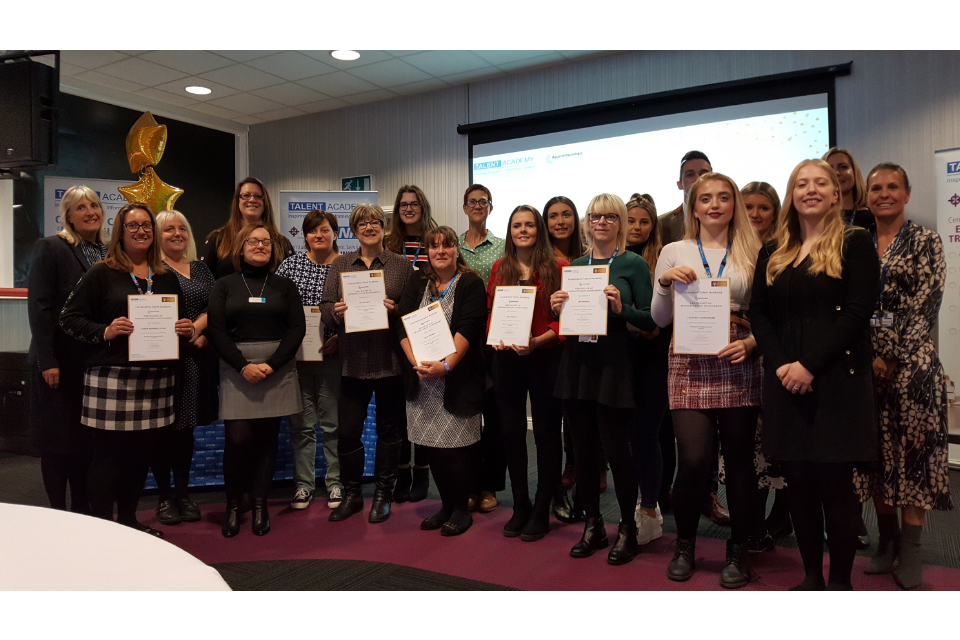How employers are making the most of apprenticeship incentives
Examples of how businesses are using government incentives to hire apprentices

As part of the government’s ‘Plan for Jobs’, there are a range of government programmes available for employers, including apprenticeships.
Apprenticeships are jobs which combine practical on-the-job skills training with sustained off-the-job learning, available from entry level to master’s degree-equivalent. Your employee will get training in the knowledge, skills and behaviours that are relevant to their job and you will need to pay them a salary.
Find out more about apprenticeships.
We’ve compiled several case studies from businesses making the most of the government incentives, including:
- MTR Elizabeth Line
- Smith & Williamson
- Lincolnshire Partnership NHS Foundation Trust
- Vianet
- Softcat
- Lookers PLC
- Walsall Council
MTR Elizabeth Line
MTR Elizabeth Line, based in London and operator of sustainable rail transport services, heard about the hire a new apprentice incentive through media coverage, before checking GOV.UK to understand the incentives in more detail.
In August the company registered, through their Apprenticeship Service account, for the ‘Hiring a new apprentice’ incentive for two new apprentices to join their team of over 500 past and current apprentices. MTR Elizabeth Line are proud to have increased their apprentice salary to align with London Living Wage rates of pay – and the incentive payment will help support these costs and the costs of uniforms.

The incentive payment will also benefit the business by allowing MTR Elizabeth Line to continue to develop the skills of people from the communities they serve, many of whom are from disadvantaged backgrounds or underrepresented groups. Some apprentices may require additional support during their apprenticeship and the incentive payment will enable MTR Elizabeth Line to employ apprentices that may require additional support during their training.
The company are also in the process of applying for the Kickstart incentive, to offer thirty 6-month paid work placements. This will allow MTR Elizabeth Line to support young people by helping to develop their skills so they are ready to find sustained employment on completion of their placement; working to offer of permanent employment within the business for those individuals that demonstrate their commitment and motivation during their placement.
Paul Siniecki, Strategic Labour Needs and Training Manager at MTR Elizabeth Line said:
We plan to continue to offer apprenticeship opportunities in 2021 and will be recruiting for the role of Customer Experience Assistant to work at the new stations in the Crossrail tunnel, and we will also be using the new ‘Redundancy Support Service for Apprentices’, who have been made redundant, for future apprenticeship opportunities, supporting those that have lost their job and giving them a new start.
MTR Elizabeth Line also work closely with the Steps into Work programme, a three-way partnership between TfL, Mencap and Barnet & Southgate College that provides 12-month of work experience for adults with mild to moderate learning disabilities and/or on the autism spectrum. Two of their current apprentices have been recruited following completion of the Steps into Work programme. MTR Elizabeth Line are also looking at T level learner recruitment in the future, following the delayed opening of the Elizabeth line.
Smith & Williamson
Smith & Williamson is among the ten largest firms of accountants in the UK. With a workforce of 1800, Smith and Williamson has 124 apprentices, in roles including Assurance & Business Services, Business Tax and Private Client Tax. The firm merged with Tilney Group in September 2020 and is now part of the Tilney Smith and Williamson Group.

Smith and Williamson has applied for the incentive payments for hiring new apprentices after hearing about them through financial media. Having recruited their largest-ever intake of apprentices during 2020, including those joining straight from school, the incentive payment will be used to support individuals as they work from home during the pandemic, and to ensure they continue to receive quality time and mentoring from their line managers. The payment will also support Smith and Williamson’s aim to recruit more apprentices into the business.
Claire Davis, Head of Learning and Development for Professional Services at Smith & Williamson, said:
The firm has seen many benefits of the apprenticeship programme already, including access to a more diverse talent pool and, development of professional skills and behaviours that are key to personal and business success in today’s world, as well as technical knowledge, increased loyalty among apprentices and positive feedback from clients.
Smith and Williamson is committed to offering apprenticeship opportunities and we are seeking to continue to develop and extend our programmes in 2021.
Lincolnshire Partnership NHS Foundation Trust
Lincolnshire Partnership NHS Foundation Trust first became aware of incentive payments for apprenticeships via Health Education England and their Education and Skills Funding Agency Account Manager.
The Trust has a workforce of 2300, including social workers, occupational therapists, nursing associates and administration apprentices, in addition to mental health nursing apprentices due to commence in January 2021.
The Trust welcomes the introduction of the incentive payments for apprentices, given the national shortage of nurses, and the target to employ 50,000 more nurses nationally by 2025.

Recognising that there are a number of vacancies in all disciplines of nursing in rural Lincolnshire, with many rural towns finding it difficult to appoint, the Trust is delighted to employ 10 nursing apprentices from the local area, using the incentive payments. By employing apprentices and training their own staff into clinical positions, the Trust supports their local community by offering meaningful careers, whilst retaining trainees beyond training, due to their ties to the local area.
The incentive payment for apprenticeships is being used by the trust to support nursing apprentice salaries, and the other costs incurred the recruitment of apprentices.
The Trust has also received financial support from Health Education England for nursing apprenticeships which makes cohort recruitment and training possible. The Trust will also access the £1500 or £2000 grant for age related apprenticeship starts.
Vianet
Digital technologies company Vianet, based in the North East, worked closely with the Tees Valley Combined Authority - and immediately knew the advantages of accessing the incentive payment for apprentices. With a head count of 153 and 4 current apprentices, Vianet has applied for approximately £25,000 in incentives, to support their increasing workforce through apprenticeships.

Their ‘grow within’ ethos means Vianet provides apprenticeship opportunities to existing staff. Apprenticeships work for Vianet, as they allow employees to expand their knowledge, whilst having a structured learning programme that embeds back into the projects they are working on; making a real impact on the organisation.
The incentive payment for new apprentices, with apprenticeship levy and some additional external funding, will allow Vianet to employ and recruit during this difficult time, something they would not have normally been able to do.
Vianet also currently have three interns and are considering if the business could also support a trainee.
Maret Ward, Learning and Development adviser said:
Apprenticeships are great as they allow individuals of all ages to have a strong post -16 alternative to the academic route. Organisations benefit from reduced recruitment and training costs, or salary costs in some cases with apprenticeships; whilst the apprentice brings improved productivity into the workplace.
It is important that an organisation has a robust commitment to the programme when they recruit. Apprentices become high calibre employees who can demonstrate industry skills, backed with the academic learning that apprenticeships offer.
I am delighted that our own apprentice had an alternative route to a great career and is progressing to degree level. In return, we benefit from the high levels skills and intelligence he brings to our business.
Softcat
IT infrastructure and services provider Softcat employ over 1500 staff, with 51 apprentices; representing just over 3 per cent percent of the organisational headcount.
Through their training provider network, Softcat were made aware of the government incentives for employers and applied for the incentive payment for hiring new apprentices.

This additional funding, totalling £90,000, will help support the recruitment of 45 new apprentices, along with many other things. Other than the financial benefit this payment will provide, Softcat will direct this funding to additional training and better experiences for their apprentices – especially in the current climate when they are working from home.
Lois Simon, Learning and Development Lead said:
Accessing the incentive payment for hiring new apprentices means that Softcat can better support the cohort of new apprentices joining the team. This significant funding will see apprentices benefit from more support as they start their apprenticeship, whilst helping to fund the apprentice journey – including incentives for apprentices themselves, extra-curricular activities and graduation ceremonies, when apprentices complete their learning.
The benefits of apprenticeships to business are significant and I would urge employers to continue to recruit during this time, and to access the support that’s been made available to support all employers through the process.
Lookers PLC
Manchester based Lookers PLC, who offer new and used cars from leading manufacturers, are accessing the incentive payments for apprentices to support their apprentice intake this year.
The business has 6,700 employees, and apprentices make up 7% of the workforce. Lookers have 185 apprentice vacancies to fill across the Group, with 135 vacancies in England, and in scope for the incentive payment for apprentices.

Lookers see the incentive payment for apprentices as a driver to financially secure their apprenticeship program moving forward, and are modelling to bring in considerable funds as a result of the intake before 31st January 2021. These funds will secure future apprenticeships for years to come, under the 95% Government contributed co-investment model.
Matt Clay, Group Qualifications Manager at Lookers said:
We’re continuing our investment into apprenticeships, attracting bright young talent into the business. The current climate has the potential to leave a damaging impact on the future of young people, and we’re delighted to offer 185 Apprenticeship roles across the Group during this time, enabling opportunities for these young people to build their confidence, skills and experience.
Our continued investment into apprenticeships is a result of the recognised value they generate for the business; for every £1 invested we realise a return of £20. The current Government support package will build upon the commercial impact of our apprentices, enabling us to secure the financial future of the Program, having moved into the Government co-investment model.
Walsall Council
Walsall Council have a workforce of over 7400, with apprentices representing 5.26% per cent of their head count. The Council has recently accessed the incentive payments for apprenticeships, with payment totalling £31,000 so far.
The incentive payments accessed by Walsall Council will support with the recruitment of 19 Teaching Assistants and the associated wage costs in schools, where budgets are tight, and in the recruitment of 2 Level 7 Degree apprentices, to work in finance and business support. The council have plans to recruit apprentices in Motor Vehicle, Customer Service, alongside a Learning Mentor Apprentice, over the next few months.

The Council were involved in the development of the Incentive payments for hiring a new apprentice and consultations with employers, before they became live on 1 September.
Helena Baxter, apprenticeship lead, Walsall Council said:
Apprenticeships are good for business, as apprentices can be moulded and shaped in their area of expertise, to deliver the exact skills your business needs.
Apprentices are the future decision makers, managers and leaders of Walsall Council and continuing to bring apprentices into the business, even in such difficult times, is important to protect our future, whilst ensuring we continue to deliver the vital services our communities depend upon.
I would urge all employers to continue to recruit, and to benefit from government incentives to ease financial burden, whilst offering exciting and rewarding careers opportunities to apprentices.
Updates to this page
Published 17 November 2020Last updated 23 November 2020 + show all updates
-
We have added a case study from MTR Elizabeth Line about how they are using apprenticeship incentives.
-
We have added further examples from the Lincolnshire Partnership NHS Foundation Trust and Smith & Williamson on how they're making the most of apprenticeships.
-
First published.